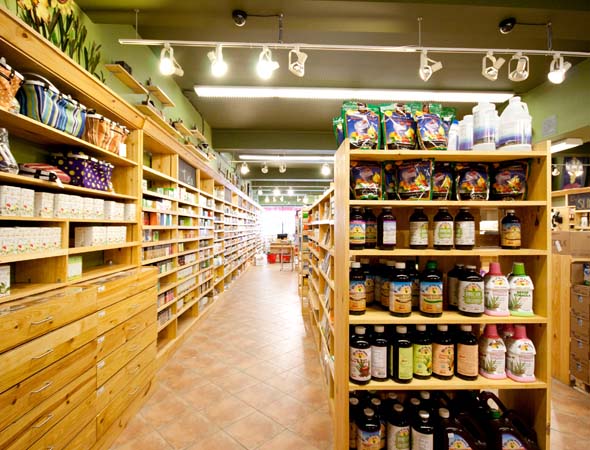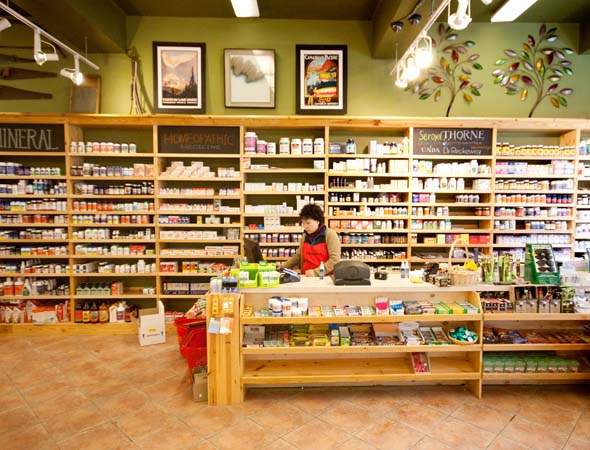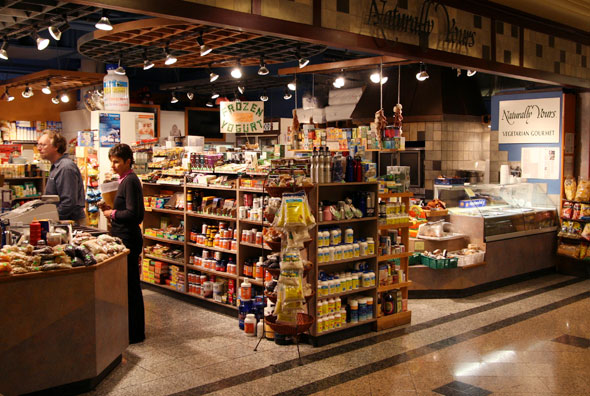Health food store
A health food store (also: health food store ) is a grocery store, the products offered for sale from organic farming (organic food ) and environmentally friendly processing date. Besides food and personal care and cleaning products, clothing and other everyday products are offered frequently - essential aspects are the least possible pollution of the goods offered and their environmentally friendly production. The food comes almost all from organic farming. Conventionally grown foods are almost never sold in health food stores; if they do, they are usually marked. Genetically modified foods are not to be found in health food stores.
History
1970s
Organic Food Stores arise at the beginning of the 1970s, first in large cities. As the first German health food store applies the 1971 in Berlin opened shop " Peace Food", which was operated by Ramon and Anchala Mark and was acquired by the organization Ananda Marga Yoga mid 70s. Within the decade, the number of stores grew in the triple digits. As early as 1975 there was the first wholesaler, from 1979 regional distribution cooperatives. During this time selling health food stores mainly vegetarian food from traditional production, which often had to be filled by the customers themselves from bags or cartons. There was also a range of goods that are associated with an alternative lifestyle: Candles, Incense, Henna, recycled paper, books and brochures. A key product of this time was the self- mixed muesli. During the 1970s, the health food stores developed to communicative meeting places, which supported the basic work of various political groups and citizens' initiatives as multipliers.
1980s
After the number of stores had grown to over 1,000 retail outlets, numerous owners concentrated on efficient operation and improved appearance. Thus, the shops have opened themselves to the normal customers increasingly. About Mergers tried the scene to present itself as an industry and to cooperate in product procurement, training and public relations. Also, first quality control of organic products were organized. From the Association of Natural Food eV emerged to represent the interests of the retail trade, which was converted in 1988 eV retail in the Federation Natural Food Products. In the same year, the Federation of organic food and natural products wholesaler the forerunner of today's Federal Association of Organic Natural Products Association was founded in Production and Trade Association. The two national associations Natural Food Natural Products campaigned for the preservation of the grown skilled trade structure. Department stores and supermarkets began in the 1980s to care for the listing of organic product lines.
1990s
The professionalization of health food stores led in the 1990s to a final repositioning: Only a few health food stores remained the image of the 1970s obliged, most saw themselves as strong advisory specialty shops for organic products. Ideological reservations about vegetarians and health-oriented buying motives, such as by supporters of whole foods, this orientation were subordinated: cereals, wholemeal bread and tofu although there was still, but both meat and sugar were more and more to offer - but basically from organic production. The EC Regulation on organic farming (EGVO 2092 /91) another control regulations were introduced in 1991, which was expanded to include guidelines for animal products in 1999. Conventional supermarkets tried with limited success as competition for organic food retail trade, conversely, it was from about mid-1990 the first experiments with pure organic supermarkets.
After 2000 (as of April 2005)
The product range has been expanded and more adapted to the customer needs, and supplemented by expert advice on. Increasingly open organic supermarkets and health food stores with cheese and meat counter and integrated eco - bakery shop. In addition, many health food stores rely on the idea of a delivery service and offer their customers already put together boxes of vegetables including recipe suggestions. With the opening of the first Vierlinden natural market in Dusseldorf ventured to the Rewe group, the first great German food retailer in the market segment. By 2011, the Vierlinden markets are, however, changed, sold or closed to other Rewe formats. Instead, Rewe introduced the concept Temma organic market in which the sale of organic food is combined with eating.
Motivation and Philosophy
While originally created in the 1920s health food stores situate their roots primarily in the life reform movement, there is at the foundation of health food stores different motivations that lead first to a wealth of orientations. Among them, there in the 1970s, three main motives make that occur in mixed forms: The goods are first produced in an environmentally friendly, serve political objectives 2 and / or 3 be conducive to spiritual development.
The boundaries between customers and retailers will be broken in the early days: the customer support the goals of the health food store both ideologically and through active participation, such as the packaging of products or conversions in the sales rooms. The owners, in turn, often have an open spreadsheet and made no significant gains. Until well into the 1990s in, in some cases even today (2005), to name a Bioladenbesitzer not an entrepreneur or owner, but " Ladner ". Nevertheless, the distribution of roles has changed: health food stores to earn profits and put their customers for any services and advertising; active involvement of customers takes place only very rarely.
2005 Organic Food Stores understand little more than political center or esoteric ideas. Environmental protection, however, is still a positively evaluated aspect of the assortment. Again, this is surpassed by new motifs: health food store in now are mainly health and enjoyment of quality food in the foreground, is added the fear of food scandals.
Difference between health food stores and health food stores
In bio shops foods are not from organic farming now the absolute exception; in health food stores, however, is not the idea of organic food in the center, but the article in the healthy and nutritionally valuable nutritional and personal care products whose active substances derived from natural sources - regardless of whether they come from organic farming or not. In addition, can be found in health food stores so-called dietary supplements ( vitamins, omega-3 fatty acid capsules, etc. ), which are normally not sold in health food stores or at least are present only in low range.




.jpg)




